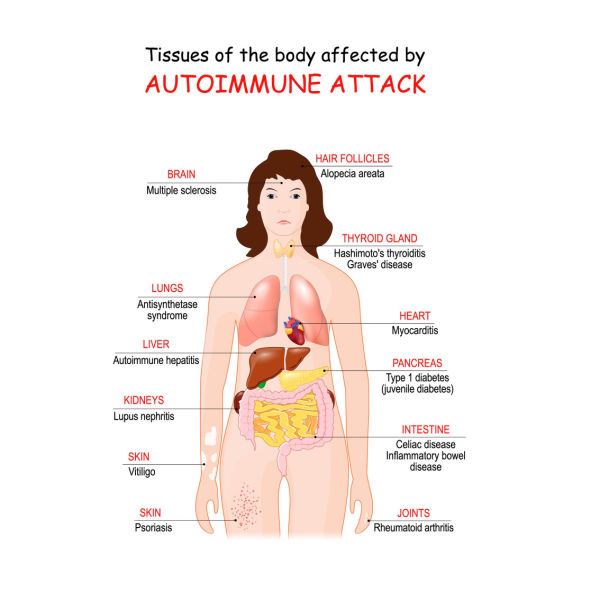Autoimmune diseases are becoming increasingly common. The older we get, the more likely we are to develop one. It is important that we do as much as we can to prevent this so that we can not just live long, but live well.
What Is An Autoimmune Disease?

Autoimmune diseases are diseases that cause the body’s natural defense system to begin to look at normal cells as invading, “bad” cells and begin attacking them by mistake. For example, in rheumatoid arthritis, the immune system attacks cells in the lining of joints. This causes the joints to become swollen and inflamed and is incredibly painful. Type 1 diabetes is an autoimmune disease in which the immune system destroys the insulin-producing cells in the pancreas. Psoriasis causes inflammation in the skin, creating raised, scaly patches. This is not only highly uncomfortable but also very hard on a patient’s mental health. These illnesses are not age or gender-specific, however, they are more common in older people, especially women.
Both vitamin D and omega-3s have been shown to be effective against inflammation. The researchers thought that maybe if these supplements are effective at reducing inflammation and managing symptoms, perhaps they might actually be effective at preventing these diseases altogether. So far, the results of their research are looking good, however further study is needed for conclusive results. Common autoimmune diseases in women include:
- Rheumatoid arthritis is a form of arthritis that attacks the joints
- Psoriasis is a condition marked by thick, scaly patches of skin
- Psoriatic arthritis, a type of arthritis affecting some people with psoriasis
- Lupus is a disease that damages areas of the body including joints, skin, and organs
- Thyroid diseases, including Graves’ disease, where the body makes too much thyroid hormone (hyperthyroidism), and Hashimoto’s thyroiditis, where it doesn’t make enough (hypothyroidism) of the hormone
- Type 1 diabetes is a condition in which the immune system damages the insulin-producing cells in the pancreas
Symptoms of autoimmune disease may be severe in some people and mild in others. “There are different degrees of autoimmune disease,” says Orbai. “The symptoms a person gets likely relate to multiple factors that include genetics, environment and personal health.”
Read More: Do Vitamin B12 Supplements Cause Acne, Bone Fractures, and Lung Cancer?
Practitioner Tip:

We regularly use The Health Shop’s Vitamin D3 which is better at raising your 25(OH)D levels than vitamin D2 and lasts longer in your body. Second, their vitamin D3 soft gels are delivered in a base of organic flaxseed oil. Because vitamin D is fat-soluble, it’s better absorbed in the presence of fat.
We also recommend The Health Shop’s Wild Omega-3. It is a molecularly distilled, pharmaceutical-grade, pure fish oil sourced only from anchovies and sardines. It helps improve cognitive function, supports heart health, and reduces inflammation without the fishy burps (and taste)!
Common Autoimmune Disease Symptoms

Despite the varying types of autoimmune diseases, many of them share similar symptoms. Common symptoms of autoimmune disease include:
- Fatigue
- Joint pain and swelling
- Skin problems
- Abdominal pain or digestive issues
- Recurring fever
- Swollen glands
Many women say it’s hard to get diagnosed, something that Orbai agrees with. “It’s not black or white,” she says. “There’s usually no single test to diagnose autoimmune disease. You have to have certain symptoms combined with specific blood markers and in some cases, even a tissue biopsy. It’s not just one factor.”
Diagnosis can also be difficult because these symptoms can come from other common conditions. Orbai says women should seek treatment when they notice new symptoms.
“If you’ve been healthy and suddenly you feel fatigued or joint stiffness, don’t downplay that,” she says. “Telling your doctor helps him or her to look closer at your symptoms and run tests to either identify or rule out autoimmune disease.”
Read More: Expert Encourages People to Take This Vitamin to Reduce Dementia Risk
Omega-3s and Vitamin D: Vitamin Supplements To Combine To Prevent Autoimmune Diseases?

According to research published earlier this year, two vitamin supplements that may be important to protect older adults from developing autoimmune diseases are vitamin D and omega-3 fatty acids. (1) These include diseases such as rheumatoid arthritis, psoriasis, polymyalgia rheumatica, thyroid diseases, and inflammatory diseases. All of these diseases rob older adults of mobility and quality of life in their later years. The research shows that people aged 50 and older taking 2,000 international units (IU) of vitamin D3 had a 22% lower rate of confirmed autoimmune diagnosis. Two years after taking vitamin D for at least 2 years, that prevention rate rose to 39%. (2)
As already mentioned, vitamin D wasn’t the only supplement found to make a difference in autoimmune diagnosis. The researchers also found that taking 1000 milligrams of omega-3 fatty acids showed to reduce the rate of autoimmune diagnosis. The association wasn’t quite as strong, however, as it was with vitamin D. It was only statistically significant when possible cases were included with confirmed cases.
Where the true surprise came in, however, was how much of an autoimmune powerhouse these vitamin supplements were when combined. The study found that taking both vitamin D and omega-3 supplements decreased autoimmune diagnosis by 30%, versus the placebo.
Take Preventative Action

We regularly use The Health Shop’s Vitamin D3 which is better at raising your 25(OH)D levels than vitamin D2 and lasts longer in your body. Second, their vitamin D3 soft gels are delivered in a base of organic flaxseed oil. Because vitamin D is fat-soluble, it’s better absorbed in the presence of fat.
We also recommend The Health Shop’s Wild Omega-3. It is a molecularly distilled, pharmaceutical-grade, pure fish oil sourced only from anchovies and sardines. It helps improve cognitive function, supports heart health, and reduces inflammation without the fishy burps (and taste)!
More Research Needed

The researchers were transparent about their study in that it is not conclusive. They still have not done a large randomized clinical trial on either of their effects on autoimmune disease prevention. They also need to do one for the two vitamin supplements paired together. Still, they are saying that it is advisable that older adults take each of these supplements daily.
“This is the first direct evidence in older adults that taking vitamin D or omega-3 fatty acids – or a combination – for five years reduces autoimmune disease incidence, with more pronounced effect after two years of supplementation,” said lead author Dr. Karen Costenbader, who is a professor of medicine at Harvard Medical School in the division of Rheumatology, Inflammation and Immunity and the director of the lupus program at Brigham and Women’s Hospital in Boston. (3)
Beyond preventing the onset of autoimmune diseases, vitamin D and omega-3 fatty acids have so many other benefits that it is hard to go wrong. It should be noted, however, that you can take too much vitamin D. Vitamin D is a fat-soluble vitamin, meaning that your body can store it in your fat cells. This means that it is possible to take too much and reach toxic levels in the body. As always, talk to your doctor before starting any new supplement routines.
DISCLOSURE: This site contains product affiliate links. We may receive a commission if you make a purchase after clicking on one of these links.
Read More: Autoimmune disease may be prevented by vitamin supplements, study finds

